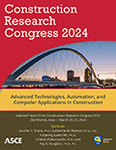Unsupervised Adversarial Domain Adaptation in Wearable Physiological Sensing for Construction Workers’ Health Monitoring Using Photoplethysmography
Publication: Construction Research Congress 2024
ABSTRACT
Recent advancements in wearable physiological sensing and artificial intelligence have made some remarkable progress in workers’ health monitoring in construction sites. However, the scalable application is still challenging. One of the major complications for deployment has been the distribution shift observed in the physiological data obtained through sensors. This study develops a deep adversarial domain adaptation framework to adapt to out-of-distribution data (ODD) in the wearable physiological device based on photoplethysmography (PPG). The domain adaptation framework is developed and validated with reference to the heart rate predictor based on PPG. A heart rate predictor module comprising feature generating encoder and predictor is initially trained with data from a given training domain. An unsupervised adversarial domain adaptation method is then implemented for the test domain. In the domain adaptation process, the encoder network is adapted to generate domain invariant features for the test domain using discriminator-based adversarial optimization. The results demonstrate that this approach can effectively accomplish domain adaptation, as evidenced by a 27.68% reduction in heart rate prediction error for the test domain. The proposed framework offers potential for scaled adaptation in the jobsite by addressing the ODD problem.
Get full access to this article
View all available purchase options and get full access to this chapter.
REFERENCES
Elgendi, M., R. Fletcher, Y. Liang, N. Howard, N. H. Lovell, D. Abbott, K. Lim, and R. Ward. 2019. “The use of photoplethysmography for assessing hypertension.” npj Digital Medicine 2019 2:1, 2 (1): 1–11. Nature Publishing Group. https://doi.org/10.1038/s41746-019-0136-7.
Goodfellow, I., J. Pouget-Abadie, M. Mirza, B. Xu, D. Warde-Farley, S. Ozair, A. Courville, and Y. Bengio. 2020. “Generative adversarial networks.” Commun ACM, 63 (11): 139–144. ACM PUB27 New York, NY, USA. https://doi.org/10.1145/3422622.
Hwang, S., and S. H. Lee. 2017. “Wristband-type wearable health devices to measure construction workers’ physical demands.” Autom Constr, 83: 330–340. Elsevier. https://doi.org/10.1016/J.AUTCON.2017.06.003.
Jebelli, H., B. Choi, H. Kim, and S. Lee. 2018. “Feasibility study of a wristband-type wearable sensor to understand construction workers’ physical and mental status.” Construction Research Congress 2018: Construction Information Technology - Selected Papers from the Construction Research Congress 2018, 2018-April: 367–377. American Society of Civil Engineers (ASCE). https://doi.org/10.1061/9780784481264.036.
Jp, S. T. A., M. Krauledat, and K. F. De. 2007. “Covariate Shift Adaptation by Importance Weighted Cross Validation.” The Journal of Machine Learning Research, 8: 985–1005. JMLR.org PUB6573. https://doi.org/10.5555/1314498.1390324.
Li, Q., Q. Li, A. S. Cakmak, G. Da Poian, D. L. Bliwise, V. Vaccarino, A. J. Shah, and G. D. Clifford. 2021. “Transfer learning from ECG to PPG for improved sleep staging from wrist-worn wearables.” Physiol Meas, 42 (4): 044004. IOP Publishing. https://doi.org/10.1088/1361-6579/ABF1B0.
Lipton, Z. C., Y.-X. Wang, and A. J. Smola. 2018. Detecting and Correcting for Label Shift with Black Box Predictors. PMLR.
Mo, S., Y. Wang, and F. Xiong. 2022. “Identification and prioritization of key health hazards to workers in roadway construction.” Transportation Safety and Environment, 4 (2). Oxford Academic. https://doi.org/10.1093/TSE/TDAC009.
Ojha, A., S. Shakerian, M. Habibnezhad, and H. Jebelli. 2023. “Feasibility Verification of Multimodal Wearable Sensing System for Holistic Health Monitoring of Construction Workers.” Lecture Notes in Civil Engineering, 239: 283–294. Springer Science and Business Media Deutschland GmbH. https://doi.org/10.1007/978-981-19-0503-2_23/FIGURES/3.
Ojha, A., S. Shakerian, M. Habibnezhad, H. Jebelli, S. Lee, and M. S. Fardhosseini. 2020. Feasibility of Using Physiological Signals from a Wearable Biosensor to Monitor Dehydration of Construction Workers. 4. https://doi.org/10.3311/CCC2020-004.
Radha, M., P. Fonseca, A. Moreau, M. Ross, A. Cerny, P. Anderer, X. Long, and R. M. Aarts. 2021. “A deep transfer learning approach for wearable sleep stage classification with photoplethysmography.” npj Digital Medicine 2021 4:1, 4 (1): 1–11. Nature Publishing Group. https://doi.org/10.1038/s41746-021-00510-8.
Reiss, A., I. Indlekofer, P. Schmidt, and K. Van Laerhoven. 2019. “Deep PPG: Large-Scale Heart Rate Estimation with Convolutional Neural Networks.” Sensors 2019, Vol. 19, Page 3079, 19 (14): 3079. Multidisciplinary Digital Publishing Institute. https://doi.org/10.3390/S19143079.
Shakerian, S., M. Habibnezhad, A. Ojha, G. Lee, Y. Liu, H. Jebelli, and S. H. Lee. 2021. “Assessing occupational risk of heat stress at construction: A worker-centric wearable sensor-based approach.” Saf Sci, 142: 105395. Elsevier. https://doi.org/10.1016/J.SSCI.2021.105395.
Shimodaira, H. 2000. “Improving predictive inference under covariate shift by weighting the log-likelihood function.” J Stat Plan Inference, 90 (2): 227–244. North-Holland. https://doi.org/10.1016/S0378-3758(00)00115-4.
Temko, A. 2017. “Accurate Heart Rate Monitoring during Physical Exercises Using PPG.” IEEE Trans Biomed Eng, 64 (9): 2016–2024. IEEE Computer Society. https://doi.org/10.1109/TBME.2017.2676243.
Volpi, R., P. Morerio, S. Savarese, and V. Murino. 2017. “Adversarial Feature Augmentation for Unsupervised Domain Adaptation.” Proceedings of the IEEE Computer Society Conference on Computer Vision and Pattern Recognition, 5495–5504. IEEE Computer Society. https://doi.org/10.1109/CVPR.2018.00576.
Information & Authors
Information
Published In
History
Published online: Mar 18, 2024
ASCE Technical Topics:
- Artificial intelligence and machine learning
- Business management
- Computer programming
- Computing in civil engineering
- Construction engineering
- Construction management
- Construction sites
- Employment
- Engineering fundamentals
- Equipment and machinery
- Labor
- Measurement (by type)
- Methodology (by type)
- Occupational safety
- Personnel management
- Practice and Profession
- Probe instruments
- Public administration
- Public health and safety
- Research methods (by type)
- Safety
- Sensors and sensing
- Validation
Authors
Metrics & Citations
Metrics
Citations
Download citation
If you have the appropriate software installed, you can download article citation data to the citation manager of your choice. Simply select your manager software from the list below and click Download.
